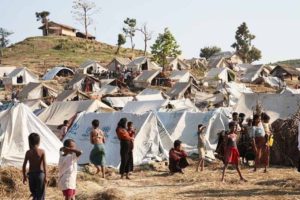Monsoon threatens Rohingya camps
 They have faced repression, discrimination and violence at the hands of the Burmese military. Now Rohingya refugees who have fled ethnic violence in Myanmar are at risk of “a humanitarian crisis within the crisis” as the monsoon season threatens to flood camps and spread disease.
They have faced repression, discrimination and violence at the hands of the Burmese military. Now Rohingya refugees who have fled ethnic violence in Myanmar are at risk of “a humanitarian crisis within the crisis” as the monsoon season threatens to flood camps and spread disease.
The United Nations warned this week that more than 100,000 refugees living in makeshift camps in Bangladesh are in areas prone to flooding and landslides, and tens of thousands will have to be relocated before the monsoons hit in March.
UN High Commissioner for Refugees Filippo Grandi said the Ronhigyas “lives are greatly at risk”.
Although the movement of refugees crossing the border into Bangladesh has eased, the Rohingya, a long-persecuted Muslim minority in Myanmar, are continuing to flee their homes.
About 1,500 have arrived in Bangladesh this month, bringing with them reports of continued violence by Myanmar’s authorities, including the abduction of girls and young women, enslavement and forced starvation
Bangladesh’s ambassador to the UN Masud Momen said despite an agreement between Bangladesh and Myanmar for the voluntary repatriation of the refugees, most do not feel safe enough to return home and many have no homes to return to.
Ambassador Momen said the Rohingya are among the “most persecuted minority in the world”.
Aid agencies are calling the onset of the Monsoon as a “crisis within a crisis”.
Around 700,000 Rohingya have fled to camps in Bangladesh since last August, when attacks on police posts by Rohingya insurgents in Rakhine State in western Myanmar provoked a vicious backlash by the military and local Buddhists.
At least 6,700 Rohingya, including 730 children younger than 5, were killed, according to Doctors Without Borders, and hundreds of villages were destroyed in what the United States and other countries have called a campaign of “ethnic cleansing”.
Myanmar’s government, which does not recognise the Rohingya as a distinct ethnic group, has denied that members of the military carried out mass killings. Any military actions in the region, the government says, were in response to the threat posed by Rohingya militants.
Myanmar’s ambassador to the United Nations, Hau Do Suan, told the Security Council that the government would investigate reports of mass graves and extrajudicial killings by the police and military.
But Myanmar government has so far blocked access to the region by a UN fact-finding mission and all but a few aid organisations.
The government has also cracked down on independent reporting from the region after reports of atrocities leaked out.
Late last year, two Reuters reporters were arrested after gathering information about mass killings by the military and police forces, as well as by villagers.
The reporters remain in custody despite calls from the UN secretary-general and others for their release.
Both reporters have been charged under the colonial-era Official Secrets Act and face up to 14 years in prison. Their investigation, published by Reuters last week, includes admissions from ethnic Rakhine Buddhists that they had taken part in the killing of ten Rohingya men in the village of Inn Din in Rakhine State.
Laurie Nowell
AMES Australia Senior Journalist












